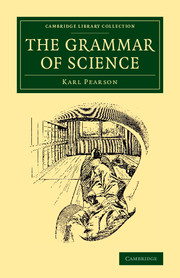
-
Select format
-
- Publisher:
- Cambridge University Press
- Publication date:
- 05 June 2015
- 18 December 2014
- ISBN:
- 9781139878548
- 9781108077118
- Dimensions:
- Weight & Pages:
- Dimensions:
- (216 x 140 mm)
- Weight & Pages:
- 0.7kg, 514 Pages
You may already have access via personal or institutional login
Book description
First published in 1892, this important work by the mathematician Karl Pearson (1857–1936) presents a thoroughly positivist account of the nature of science. Pearson claims that 'the scientific method is the sole gateway to the whole region of knowledge', rejecting additional fields of inquiry such as metaphysics. He also emphasises that science can, and should, describe only the 'how' of phenomena and never the 'why'. A scholar of King's College, Cambridge, and later a professor at King's College and University College London, Pearson made significant contributions to the philosophy of science. Including helpful chapter summaries, this book explores in detail a number of scientific concepts, such as matter, energy, space and time. The work influenced such thinkers as Albert Einstein, who considered it to be essential reading when he created his study group, the Olympia Academy, at the age of twenty-three.
Contents
Metrics
Altmetric attention score
Full text views
Full text views help Loading metrics...
Loading metrics...
* Views captured on Cambridge Core between #date#. This data will be updated every 24 hours.
Usage data cannot currently be displayed.
Accessibility standard: Unknown
Why this information is here
This section outlines the accessibility features of this content - including support for screen readers, full keyboard navigation and high-contrast display options. This may not be relevant for you.
Accessibility Information
Accessibility compliance for the PDF of this book is currently unknown and may be updated in the future.


